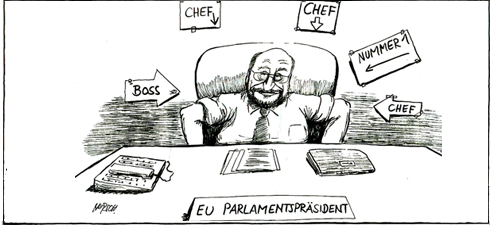Giuseppe Sandro Mela.
2016-09-15.
«Martin Schulz should not seek another term as president of the European Parliament and allow a center-right MEP to take over the role»
*
«Merkel’s Christian Democratic Union and its Bavarian sister party the Christian Social Union believe it is time for a conservative to be at the head of the Parliament»
*
«Strains in Germany’s right-center ruling coalition are playing out in the race for the presidency of the European Parliament, with the conservative European People’s Party (EVP) trying to oust Martin Schulz, a German center-left Social Democrat»
*
«Manfred Weber, who heads the EVP party in the European Parliament and is also German, told the Bild newspaper the party would present its own candidate for the presidential race in January 2017 to replace Schulz»
*
«Merkel’s conservative Christian Democrats are jockeying for position with the Social Democrats ahead of next year’s federal election in Germany»
* * * * * * *
«Martin Schulz (Hehlrath, 20 dicembre 1955) è un politico tedesco.
Schulz è stato presidente del gruppo parlamentare dell’Alleanza Progressista dei Socialisti e dei Democratici presso il Parlamento europeo e il 17 gennaio 2012 è stato eletto presidente del Parlamento europeo, riconfermato il 1º luglio 2014 con 409 voti a favore.
Martin Schulz, il più giovane tra cinque fratelli, è figlio di Paul Schulz e Clara Schulz. Il padre, poliziotto, proveniva da una famiglia di minatori della Saarland, di orientamento socialdemocratico. La madre proveniva da una famiglia borghese e fu cofondatrice della sezione locale della CDU della sua città natale Hehlrath (oggi Eschweiler).
Martin Schulz, dopo aver frequentato il ginnasio superiore a Würselen, ha svolto un apprendistato come libraio dal 1975 al 1977. Negli anni tra il 1977 e il 1982 ha prestato attività presso diverse librerie e case editrici. Nel 1982 e fino al 1994 è stato proprietario di una libreria a Würselen.
La carriera politica di Schulz si è svolta interamente all’interno del Partito Socialdemocratico di Germania, a cui si iscrisse a diciannove anni nel 1974. Fu attivo all’interno della Jusos, l’organizzazione giovanile del partito, presiedendone la sezione di Würselen e poi la sezione del circondario di Aquisgrana. Fu consigliere comunale di Würselen, cittadina di quasi quarantamila abitanti nella Renania Settentrionale-Vestfalia, dal 1984 al 1999 e ne fu sindaco dal 1987 al 1998[4]. All’epoca della nomina, con i suoi trentun anni, era il sindaco più giovane del Land.
Nel 1991 Schulz fu nominato membro del consiglio nazionale del partito, di cui fece parte ininterrottamente sino al 1999. Nel dicembre 1999 entrò nell’ufficio di presidenza e nel direttivo federale dell’SPD » [Fonte]
* * * * * * *
Il suo settarismo si è concretizzato in una comportamento faziosamente di parte, che gli è valso numerose risposte altrettanto tranchant.
«signor Schulz, so che in Italia c’è un produttore che sta montando un film sui campi di concentramento nazisti: la suggerirò per il ruolo di kapo. Lei è perfetto!»
*
«M. Schulz, qui est le président du groupe socialiste au Parlement, est un monsieur qui a la tête de Lénine et parle comme Hitler.»
*
«Mais je ne sais pas pourquoi tu t’énerves, Martin. Tu n’es pas encore Président du Parlement ! Du calme, camarade, du calme.»
*
«some Germans still find it difficult to accept diversity in Europe and differences of opinion»
*
«È insopportabile sentir pronunciare menzogne alla Knesset e per giunta in tedesco» [Uri Orback, Ministro israeliano]
* * * * * * *
Il suo passato di alcolizzato ne ha marcato severamente il comportamento.
Adesso anche i fedeli alleati di un tempo lo vogliono far fuori. Ma la sua superba ambizione sfiora i tetti del cielo:
«The German option has proven challenging. The one attractive, immediate opening was to run as the Social Democrats’ (SPD) nominee for the chancellorship in Germany’s general elections in fall of 2017»

2 pensieri riguardo “Herr Martin Schulz. Altra testa socialista che sta per cadere.”
I commenti sono chiusi.